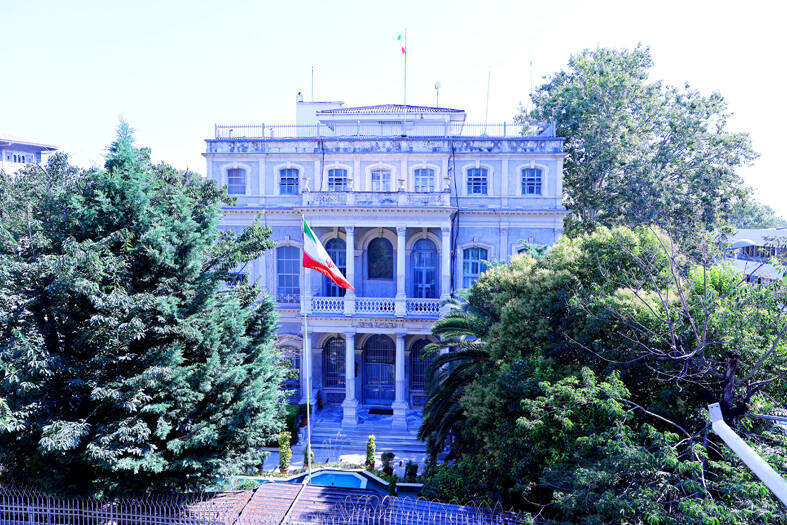Iranian and European diplomats met yesterday in Istanbul to embark on the latest drive to unpick the deadlock over Tehran’s nuclear program.
Representatives from the UK, France and Germany, known as the E3 nations, gathered at the Iranian consulate building for talks centered on the possibility of reimposing sanctions on Iran that were lifted in 2015 in exchange for Iran accepting restrictions and monitoring of its nuclear program.
The return of sanctions, known as a “snapback” mechanism, remains on the table, a European diplomat said on condition of anonymity.

Photo: EPA
“A possible delay in triggering snapback has been floated to the Iranians on the condition that there is credible diplomatic engagement by Iran, that they resume full cooperation with the International Atomic Energy Agency, and that they address concerns about their highly-enriched uranium stockpile,” the diplomat said.
European leaders have said sanctions would resume by the end of next month if there is no progress on containing Iran’s nuclear program.
Meanwhile, Tehran has said that the US needs to rebuild faith in its role in negotiations.
Iranian Deputy Minister of Foreign Affairs Kazem Gharibabadi said Iran’s engagement was dependent on several key principles that included “rebuilding Iran’s trust — as Iran has absolutely no trust in the United States.”
The talks should not be used “as a platform for hidden agendas such as military action,” he said.
Gharibabadi also insisted that Iran’s right to enrich uranium “in line with its legitimate needs” be respected and sanctions removed.
Gharibabadi described yesterday’s talks as “serious, frank and detailed,” saying that the two sides discussed lifting sanctions and the snapback mechanism while agreeing to further talks.
“Both sides came to the meeting with specific ideas,” he said. “It was agreed that consultations on this matter will continue.”
Yesterday’s talks were held at the deputy ministerial level, with Iran sending Gharibabadi and fellow Deputy Minister of Foreign Affairs Majid Takht-e Ravanchi.
The identity of the E3 representatives were not clear, but the EU’s deputy foreign policy commissioner was thought to be attending.

‘WIN-WIN’: The Philippines, and central and eastern European countries are important potential drone cooperation partners, Minister of Foreign Affairs Lin Chia-lung said Minister of Foreign Affairs Lin Chia-lung (林佳龍) in an interview published yesterday confirmed that there are joint ventures between Taiwan and Poland in the drone industry. Lin made the remark in an exclusive interview with the Chinese-language Liberty Times (the Taipei Times’ sister paper). The government-backed Taiwan Excellence Drone International Business Opportunities Alliance and the Polish Chamber of Unmanned Systems on Wednesday last week signed a memorandum of understanding in Poland to develop a “non-China” supply chain for drones and work together on key technologies. Asked if Taiwan prioritized Poland among central and eastern European countries in drone collaboration, Lin

The Chien Feng IV (勁蜂, Mighty Hornet) loitering munition is on track to enter flight tests next month in connection with potential adoption by Taiwanese and US armed forces, a government source said yesterday. The kamikaze drone, which boasts a range of 1,000km, debuted at the Taipei Aerospace and Defense Technology Exhibition in September, the official said on condition of anonymity. The Chungshan Institute of Science and Technology and US-based Kratos Defense jointly developed the platform by leveraging the engine and airframe of the latter’s MQM-178 Firejet target drone, they said. The uncrewed aerial vehicle is designed to utilize an artificial intelligence computer

Renewed border fighting between Thailand and Cambodia showed no signs of abating yesterday, leaving hundreds of thousands of displaced people in both countries living in strained conditions as more flooded into temporary shelters. Reporters on the Thai side of the border heard sounds of outgoing, indirect fire yesterday. About 400,000 people have been evacuated from affected areas in Thailand and about 700 schools closed while fighting was ongoing in four border provinces, said Thai Rear Admiral Surasant Kongsiri, a spokesman for the military. Cambodia evacuated more than 127,000 villagers and closed hundreds of schools, the Thai Ministry of Defense said. Thailand’s military announced that

CABINET APPROVAL: People seeking assisted reproduction must be assessed to determine whether they would be adequate parents, the planned changes say Proposed amendments to the Assisted Reproduction Act (人工生殖法) advanced yesterday by the Executive Yuan would grant married lesbian couples and single women access to legal assisted reproductive services. The proposed revisions are “based on the fundamental principle of respecting women’s reproductive autonomy,” Cabinet spokesperson Michelle Lee (李慧芝) quoted Vice Premier Cheng Li-chiun (鄭麗君), who presided over a Cabinet meeting earlier yesterday, as saying at the briefing. The draft amendment would be submitted to the legislature for review. The Ministry of Health and Welfare, which proposed the amendments, said that experts on children’s rights, gender equality, law and medicine attended cross-disciplinary meetings, adding that